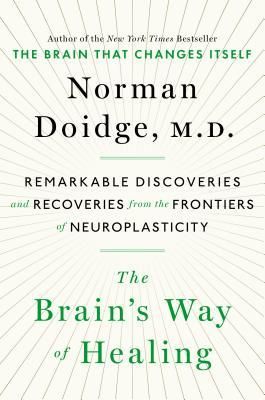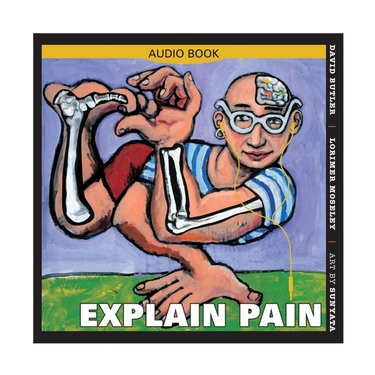Neuroplasticity (Month +6.1)

Finally, I was able to stop taking bactrim and acyclovir. Today was my first day without these antiseptic medications since my transplant over six months ago. Technically, now I'm also able to go swimming, but it's raining. I don't want to catch a cold, so I'll wait for a sunny day.
Recently, I twice read Explain Pain (Butler & Moseley), and I've since finished The Brain's Way of Healing (Doidge). The main premise of the first book is that pain is a sensation which is created in the brain when it interprets neurological signals as being the result of impending danger. Acute pain is a beneficial, logical response, but chronic pain is technically unnecessary because there is no longer danger present. In fact, since "neurons that fire together, wire together," chronic pain is actually learned pain as a result of experiencing it. As the body regularly experiences any sensation, it develops neurons, pathways and synapses to become more efficient at interpreting that experience. While this idea usually works in our favor, (for example, a guitar player gets better at controlling fingers in his left hand) it can also work to reinforce a vicious cycle.
Check out this rather humorous presentation by Lorimar Moseley briefly discussing one of the topics explained in great detail in his book, Explain Pain.

The Brain's Way of Healing is a brilliant book which gives several real-world examples of neuroplasticity at work. The old way of understanding the brain is that it is hardwired, and if damaged, loss is irrecoverable. The theory of neuroplasticity is that the brain is plastic, i.e. not only can it recover loss, it can actually rewire itself to better utilize its own resources. The case studies in this book are analyzed in great detail, and I have been utilizing some of their methods, already to a good benefit. I highly recommend this book to anyone who wants to recover from brain or nerve trauma, or who wants to keep neurological illness (such as Alzheimer's Disease) at bay.
Last week, I had MRIs done of my brain and C-spine. Both of my neurologists had the same opinion: no change over my previous MRIs of February 2016. This is actually pretty remarkable as it evidences that the HSCT has so far been successful. I've been off all MS medications (DMTs) since February 2016, I had chemo and a stem cell transplant in May/June, and now, six months later, there's no change. Magnificient! :) In fact, my walking is slowly improving (not without significant effort, though).
Important Timeframes
- My Stem Cell Transplant Date: June 5th, 2016
- Treatment duration: 4 weeks
- Typical onset of disability reversal: +9 months
- Typical complete recovery from procedure: +1 to +2 years
- Typical maximum reversal of disability: +2 years
Disclaimer
I am not a doctor. I am a scientist (engineer) who has had MS since March 2013.
The website blogs are separated into two sections: the Treatment Blog and the Recovery Blog. Day Zero is when I received my stem cells back.
- Homeward Bound (Day +12)
- Treatment Complete (Day +11)
- Final leg of the procedure (Day +10)
- Healing fast! (Day +8)
- Neutropenia (Day +6)
- Jumped the gun (Day +3)
- Immune System Gone (Day +2)
- DAY ZERO - Got My Stem Cells Back!
- One million stem cells per kilo (Day -2)
- The “Mexican Method” (Day -4)
- Portal to the heart (Day -5)
- Waiting out mobilization, (Day -8)
- Done with first rounds of chemo (Day -9)
- A Rough Night (Day -10)
- Starting chemo now! (day -11)
- An Easy Day (day -12)
- First Major Snafu - The Flight Agent Chronicles
- We’re off
- Countdown to vacate
- Everything's Confirmed
- AHSCT and Progressive MS. Conflicting Studies (Year 6.4) - UPDATED
- Check-In (Year 5.2)
- No New Activity on MRIs (Year 3.6)
- Bloodwork Back To Normal (Year 3.3)
- Why Neurologists in the US Don't Recommend HSCT (Month +35.8)
- Better Pain Management (Month +33.6)
- Final Re-Vaccinations & The Medical Cannabis Primer (Month +32.9)
- "Sustained Decrease in Disability" (+30.6 months)
- No Progression Seen on MRI (Month +29.7)
- Cruising Along (Month +29)
- Nerve Decompression Surgery (Month +21.8)
- Looks Like It Worked (Month +17.2)
- Further Pain Improvements (Month +15)
- Significantly Lower Pain (Month +14.4)
- More Thoughts About MMJ, Meds & Pain (Month +13)
- +1 Years and Counting! (Month +12.6)
- Better & Better (Month +11.5)
- Major Pain Improvements. Finally. (Month +10.6)
- DIMS, SIMS and the Medicine Cabinet in the Brain (Month +9.6)
- Sliding Sideways ( Month +9.2)
- Pain, Pain, Go Away! (Month +8)
- Doctor: MS in Remission! (Month +6.75)
- Neuroplasticity (Month +6.1)
- Hopefully, My Last MRIs, Forever (Month +6)
- Chemobrain (Month +5.2)
- Kickin' and Screaming (Month +5)
- Month +3.7 Progress Report
- Fresh Foods Welcome! (Month +3.2)
- Thoughts About Pain (Month +3)
- Making Good Progress (Week +12)
- First Followup Rituximab Infusion scheduled (Week +9.5)
- Walking Towards Improvement (Day +54)
- Neutrophils Recovering Appropriately (Day +39)
- Less Pain Lately. Horray! (Day +25)
- The Highs & Lows of Recovery (Day +22)